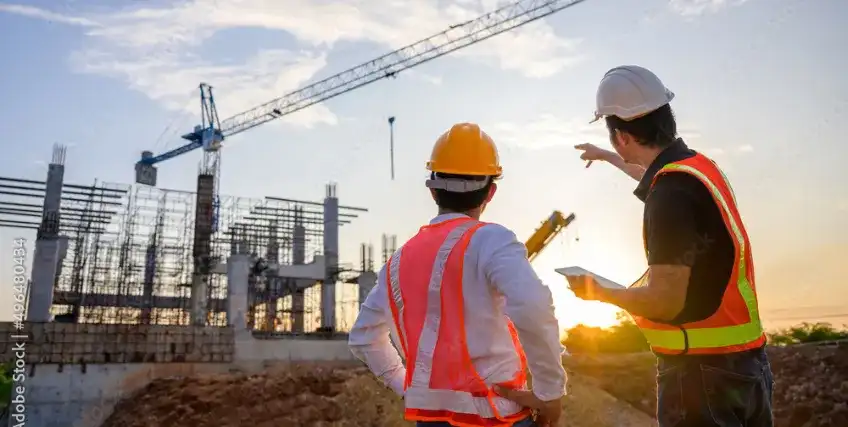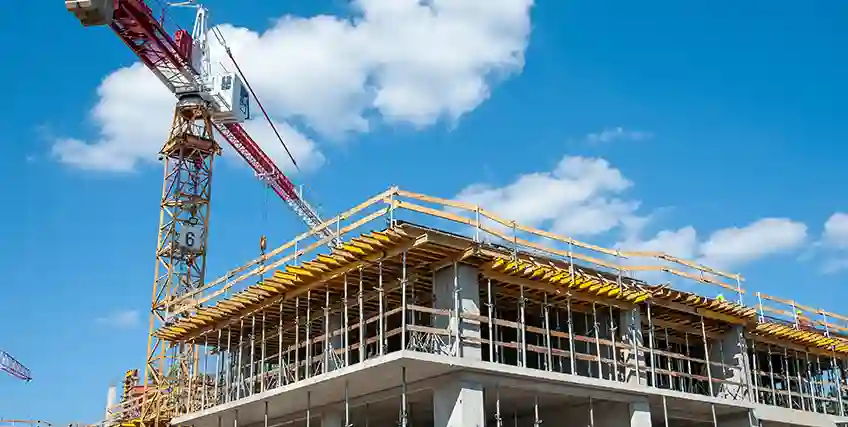What Is New Construction Financing and How Does It Work?
July 22, 2025 | Last Updated on: July 22, 2025

The U.S. building industry remains a strong driver of the economy, with nearly 700,000 employers and over 7 million employees, according to data from the Associated General Contractors of America (AGC).
Whether you're managing daily operations, investing in a new project, or simply seeking to remain competitive, construction business loans can prove to be a brilliant idea to propel your next step.
In this article, we will dissect all that you should know:
- How construction loans work
- The various types of construction loans that exist
- Typical uses of financing in the construction business
- Tips on how to qualify and apply for the appropriate loan
Knowing your new construction financing can be the difference between growth and stagnation. Let's cut to the chase and take a look at how the right new construction financing can enable you to construct not only buildings, but a thriving and resilient company.
Understanding a construction loan
A new construction loan is used for financing the construction of residential and commercial real estate. The loan applicant can be a real estate developer or an individual who can build a custom house. This loan is usually short-term loan and later replaced by longer-term mortgage financing.
New construction financing is considered risky and generally has a higher interest rate as compared to traditional mortgage loans.
Working of a construction loan
New construction financing is generally for one year. Once the construction is complete, you can either refinance the new construction financing into a permanent mortgage for your home. You can even obtain a new loan to pay off the construction loan, which is sometimes also referred to as a final loan.
There are borrowers who take out a new construction financing that is automatically converted to a mortgage loan after the completion of the home. This type of new construction financing is known as a construction-to-permanent loan.
The borrower may be allowed to make interest-only payments on new construction financing until the time the project is in progress. Some construction loans can also require the balance to be paid off completely until the project is completed.
If a new construction financing is taken out, someone who is willing to build their dream home, the mortgage lender may pay the funds directly to the contractor instead of the borrower. The payments can be made in installments as the project progresses through the new development stage.
Construction loans can also be used to finance rehabilitation and restoration projects, as well as to build new homes.
Why should you get a construction loan?
There are multiple reasons that you should get a new construction financing, some of them are listed below:
- Purchase equipment and materials: You can use the new construction financing for buying materials and equipment that can be used for the construction of new homes or business buildings.
- Hiring and training employees: You can use the funds from a construction loan to hire new employees for construction purposes. You can also finance education and training costs for those employees with your construction loan. You can also use the funds from new construction financing to hire new employees for the purpose of the construction plan. There is also a benefit of training your employees with these construction loans.
- Expanding a company’s facility: In case you are a small business owner and have a physical location, and need to build or remodel an office, then you can use new construction financing to fund your construction project.
- Overcoming damage or disaster expenses: In case you have damaged commercial or office property due to a natural disaster, such as an earthquake, or any other disaster, you can use new construction financing to make necessary repairs.
Types of construction loans
Below are some of the new construction financing options that you can get from the best construction loan lenders.
Construction mortgage loans
A construction loan is an adjustable-rate financing option that can help you purchase land or build a house on property you already own. Unlike standard term loans, construction loans are disbursed in phases, known as "draws," as construction progresses. Prior to each draw, lenders typically require inspections to verify the work against predetermined milestones.
As the borrower, you only pay interest on the amount you've drawn, which can help manage cash flow during construction. This is in contrast to a term loan, where you're given a sum of money upfront and pay interest on the entire amount from the start.
Construction loans typically have a limited life, typically about a year, corresponding to the projected time to finish the building. At the end of construction and all interest payments, permanent funding or loan repayment must occur.
In applying, lenders review your debt-to-income ratio very carefully to find the most suitable loans for you in your circumstances and qualify you for permanent funding after construction.
Construction-to-permanent loans
This is also referred to as a CP loan. A construction-to-permanent loan provides an expedited means to fund the construction of a new home by merging two loans into a single, streamlined process.
During the construction phase, borrowers of a construction-to-permanent loan pay interest only on the outstanding balance. The interest rate is adjustable and based on the prime rate, a rate that's determined by the Federal Reserve's federal funds rate. Thus, if the Fed increases rates, your loan interest could rise as well.
Once your building plan is complete, along with the construction costs, the loan is automatically converted to a permanent mortgage, typically a 15- or 30-year loan. Now you begin paying both interest and principal, similar to an ordinary home loan.
To homeowners and small business owners, the benefit of a construction-to-permanent loan is convenience. Rather than securing separate loans during construction and afterward, you borrow for both funding phases at once. That means you endure the closing process only once and pay only a single set of closing fees, saving time and money.
If new construction financing is on your radar, a construction-to-permanent loan may make your journey from blueprints to moving day easier. It offers security through the building phase and a seamless transition to long-term homeownership.
Commercial construction loans
Suppose you want to think big and plan to construct a huge apartment building, multi-unit retail center, high-rise, commercial office building, or any other large construction project; this is the loan that will be the right fit for you.
Lenders for modern commercial construction loans for huge projects are high-risk. They will be expecting the developers to shoulder most of their risk by covering 90% cost of the project. If you are involved in this type of project, you need to be prepared with cash in hand so that you can fund your construction independently.
Eligibility requirements for construction loans
New construction financing tends to have a strict credit requirement as compared to conventional mortgage loans, as they are not secured by collateral. Moreover, as the home doesn’t exist, it won’t be seized for non-payment of the loan programs.
Local credit unions or regional banks provide new construction financing. Local banks usually are familiar with the housing market of their area and are more comfortable providing loans to borrowers who are in their community.
Most of the lenders agree on a 0 down construction loan, but others require a minimum down payment of 20% and can go up to 25%. Borrowers can face challenges to secure new construction financing if they have a limited or damaged credit history and excessive outstanding debt.
In the approval process for a new construction financing, the borrowers must provide the lender with details about their construction plan. They should also show that a qualified builder has taken up the project.
You may also like: How Lenders Assess Risk for Industrial Construction Loans
Conclusion
Whether you're building a custom home, expanding a commercial space, or restoring a damaged property, new construction financing can provide the essential capital to bring your vision to life. With multiple loan options available, each tailored to different project needs, it’s crucial to understand how they work, what lenders look for, and how to position your application for approval.
From managing construction costs to securing permanent mortgage solutions, choosing the right financing is key to long-term success. By preparing a solid construction plan and maintaining a healthy financial profile, you can make the most of today’s new construction financing opportunities.
FAQs for understanding new construction loans for investors
Is it difficult to get a new construction loan?
Obtaining new construction financing can be challenging, especially for beginner builders and owner-builders. Suppose you are a beginner at starting your first construction project. In that case, there is a possibility that many banks may reject you because you have no experience in building, and secondly, because most banks do not allow owners to build their own homes.
Do you have to put down 20% on a construction loan?
Lenders usually require a 5%–20% down payment but putting down 20% helps you avoid mortgage insurance (depending on the type of loan). This upfront cost significantly impacts the overall building cost, so budgeting for it early can lead to better loan terms and savings.
What credit score is needed for a new construction loan?
Just like any other home mortgage, new construction financing comes with the requirements that any borrower must meet to qualify for a loan. A good score is likely required for a home construction loan or office construction.
What are the negatives of construction loans?
The negative point of a construction loan is that they are short-term, and its repayment period is generally not more than three years. This eventually will lead to making large, periodic payments to repay the loan. This will put strain on their finances.
How much down payment is needed for a new construction home?
The down payment for new construction home loans may be negotiable, depending on the lender and your financial situation. Typically, you would expect to pay 5% to 20% of the total loan amount upfront to secure financing for the cost of building.
Frequent searches leading to this page
Related Articles
Beyond Banks: The Rise of Fintech Contract Financing Lenders and Real-Time Funding
January 5, 2026
New Construction Loans for Investors: The Ultimate Financing Guide
December 19, 2025
A Contractor’s Guide to Financing Commercial Construction with Business Loans
November 20, 2025
Term Loans are made by Itria Ventures LLC or Cross River Bank, Member FDIC. This is not a deposit product. California residents: Itria Ventures LLC is licensed by the Department of Financial Protection and Innovation. Loans are made or arranged pursuant to California Financing Law License # 60DBO-35839




